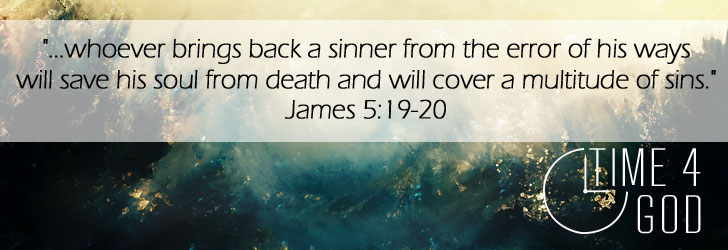Truth and Sin
There are two words in this passage that often prove to be difficult for believers and non-believers alike: ʺtruthʺ and ʺsin.ʺ These two ideas are also intimately related to one another.

There are two words in this passage that often prove to be difficult for believers and non-believers alike: ʺtruthʺ and ʺsin.ʺ These two ideas are also intimately related to one another.
What is sin? For St. James, it is ʺstraying away from the truth.ʺ You can hear the cynics among us asking, ʺWhat is truth?ʺ That was Pilot’s question to Jesus. Most of the time this question is asked in the form of a statement, rather than with an attitude of honest inquiry. It is asked as if there is no ‘real’ answer, that ʺtruthʺ is a matter of something called ʺpersonal tastesʺ. Well, if that were the case, then there would be no such thing as truth. It would be a phantom word, an insubstantial and chameleon-like word. It would be indefinable and, therefore, in reality, non-existent. No one could claim the truth about anything, no one would be able to use ʺtruthʺ in defense of any position taken. But there is such a thing as truth. There are, in fact, identifiable, universal and eternal truths in nature, in mathematics, as well as in matters of morality. We know this because there are unavoidable consequences that inevitably occur when these truths are obeyed, or defied. In matters of morality, for example, there is the Golden Rule: ʺTreat others as you would have them treat you.ʺ Why do I say that this is a ʺuniversalʺ truth? Because it appears in the scriptures of every one of the world’s major religions.
[content-ad]
What, then, is the relationship between sin and truth? Paul tells us in his Letter to the Romans, ʺFor it is not those who hear the law who are in the sight of God; rather, those who observe the law will be justified. For when Gentiles who do not have the law by nature observe the prescriptions of the law, they are a law for themselves even though they do not have the law. They show that the demands of the law are written in their hearts, while their conscience also bears witness and their conflicting thoughts accuse or even defend them on the day when, according to my gospel, God will judge people’s hidden works through Christ Jesus.ʺ (Romans 2:13-16) The ʺlawʺ here is to be understood as the ʺtruth,ʺ which has been implanted in the hearts and written on the consciences of every human being God has made. To stray away from this universal inner law, to go against this universal truth is sin, and the consequences of sin are suffering and death.
It is from sin that all disunity, all destruction, and all disorder comes. It is in the truth of Christ and Christian love that all unity, all life-giving creativity, and all just order comes. Because Christian community is rooted in the deepest reality, the deepest truth of Christian love, it always promotes the common good. To bring one who has strayed back into this community is a true good for the individual and the community. As Christians, we do not impose community, rather, we proposes it. We do not impose Christianity on others, we propose it by living out the law of love. Christianity is marked by invitation, not by an imposition of earthly rules. Christians respect human freedom completely. So, when one goes astray, we do not shut the doors on them, we leave them open. We ʺbring them backʺ only through our love, our forgiveness, and our unconditional mercy. We imitate Christ in all of this. He invited others to follow him, he did not force them too. He honors our freedom to accept his invitation, or to walk away from it. But he never closes the door of forgiveness, by which we may gain entry back into the community again, and again, and again.
G.K. Chesterton once wrote something like the following: ʺIt is not that Christianity has been tried and found wanting, but that it has been found difficult and has not been tried.ʺ The invitation to Christian community is a challenge worthy of our God-given human intellects and souls. Yes. It is difficult. But it is something worth having, therefore, it is something worth struggling for. We are up to it. Jesus told us so, and he invites us into the project of building the kingdom with him. Let us, then, love one another as Jesus loves us. And let us, as Christian brothers and sisters, pray for one another at all times, both with our words and with our deeds.
SKM: below-content placeholderWhizzco for FHB

